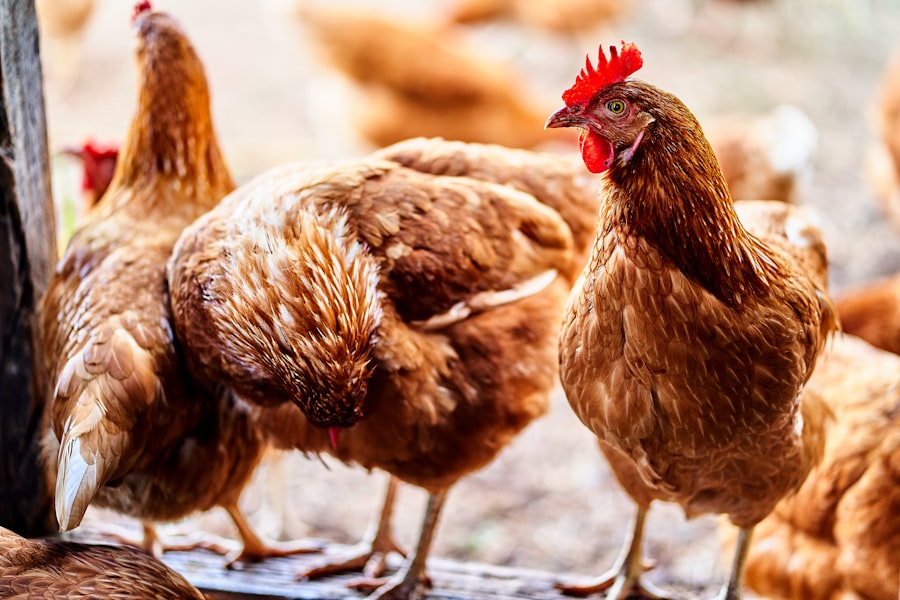Keeping chickens as a hobby has become increasingly popular in recent years, and for good reason. Not only do chickens provide a sustainable source of fresh eggs, but they also offer natural pest control and companionship. Whether you live in a rural area or an urban setting, raising chickens can be a rewarding and enjoyable experience. In this article, we will explore the benefits of keeping chickens, the importance of understanding local laws and regulations, choosing the right breed of chickens, preparing a suitable chicken coop, essential equipment and supplies, feeding and watering chickens, maintaining cleanliness in the coop, health and safety concerns, and finally, enjoying the rewards of fresh eggs and companionship.
Key Takeaways
- Keeping chickens has many benefits, including fresh eggs, pest control, and companionship.
- It’s important to understand local laws and regulations before starting a backyard flock.
- Choosing the right breed of chickens depends on factors such as climate, egg production, and temperament.
- A suitable chicken coop should provide shelter, ventilation, and protection from predators.
- Essential equipment and supplies for chicken keeping include feeders, waterers, and bedding materials.
Benefits of Keeping Chickens
One of the most obvious benefits of keeping chickens is the abundance of fresh eggs they provide. There is nothing quite like gathering your own eggs from your backyard flock. Not only are these eggs delicious and nutritious, but they also have a richer flavor and brighter yolks than store-bought eggs. Additionally, raising your own chickens allows you to have complete control over their diet and living conditions, ensuring that you are producing the highest quality eggs possible.
Another benefit of keeping chickens is their natural pest control abilities. Chickens are excellent at foraging for insects and other pests in your yard or garden. They will happily eat ticks, slugs, snails, and even small rodents. By allowing your chickens to roam freely in your yard or garden, you can significantly reduce the population of these pests without the need for harmful chemicals.
Lastly, keeping chickens can provide companionship and entertainment. Chickens are social animals that enjoy interacting with their owners. They can be surprisingly affectionate and will often come running when called. Watching them scratch around in the dirt or dust bathing can be highly entertaining and relaxing. Many people find that spending time with their chickens is a great way to unwind after a long day.
Understanding Local Laws and Regulations
Before embarking on your chicken-keeping journey, it is crucial to research and understand the local laws and regulations regarding chicken keeping in your area. This includes zoning laws, restrictions on the number of chickens allowed, and any specific requirements for chicken coops or enclosures.
Zoning laws vary from place to place, and some areas may not allow chickens at all. It is essential to check with your local government or homeowner’s association to determine if chickens are permitted in your area. Even if chickens are allowed, there may be restrictions on the number of chickens you can keep or specific guidelines for coop size and placement.
By understanding and following these regulations, you can avoid potential fines or legal issues. It is also important to be a considerate neighbor and ensure that your chickens do not cause any disturbances or nuisances to those around you.
Choosing the Right Breed of Chickens
When it comes to choosing the right breed of chickens for your flock, there are several factors to consider. Each breed has its own unique characteristics, including egg-laying abilities, temperament, size, and appearance.
If your primary goal is to have a steady supply of fresh eggs, then you will want to choose a breed known for its egg-laying abilities. Breeds such as Rhode Island Reds, Leghorns, and Sussex are known for being prolific layers. On the other hand, if you are more interested in having chickens as pets or for their ornamental value, you may want to consider breeds such as Silkies or Polish chickens, which have unique feather patterns and personalities.
Temperament is another important factor to consider when choosing a breed. Some breeds are known for being docile and friendly, while others can be more skittish or aggressive. If you have children or plan on handling your chickens frequently, it is best to choose a breed that is known for being calm and gentle.
Size is also something to consider, especially if you have limited space or live in an urban area. Bantam breeds, which are smaller versions of standard-sized chickens, are a popular choice for backyard flocks. They require less space and are generally quieter than larger breeds.
Preparing a Suitable Chicken Coop
A suitable chicken coop is essential for the health and well-being of your flock. It provides shelter from the elements, protection from predators, and a safe place for your chickens to roost and lay eggs. When preparing a chicken coop, there are several factors to consider.
Firstly, size is crucial. Chickens need enough space to move around comfortably and engage in natural behaviors such as scratching and dust bathing. As a general rule of thumb, allow at least 4 square feet of floor space per chicken inside the coop and 8-10 square feet per chicken in the outdoor run.
Ventilation is another important consideration. Good airflow is necessary to prevent the buildup of moisture and ammonia from chicken droppings, which can lead to respiratory issues. Make sure your coop has windows or vents that can be opened and closed as needed.
Security is also paramount when it comes to chicken coops. Predators such as raccoons, foxes, and even neighborhood dogs can pose a threat to your flock. Ensure that your coop is predator-proof by using sturdy materials, burying wire mesh around the perimeter to prevent digging, and securing all doors and windows with locks or latches.
Essential Equipment and Supplies for Chicken Keeping

In addition to a suitable coop, there are several essential equipment and supplies that you will need for chicken keeping. These include feeders, waterers, bedding, nesting boxes, and roosting bars.
Feeders and waterers should be designed specifically for chickens to ensure that they have access to clean food and water at all times. There are various types of feeders and waterers available, including hanging feeders, treadle feeders, and automatic waterers. Choose the type that best suits your needs and the size of your flock.
Bedding is important for keeping the coop clean and providing a comfortable surface for your chickens to walk and roost on. Straw, wood shavings, or pine pellets are commonly used as bedding materials. Make sure to regularly clean out soiled bedding and replace it with fresh material to maintain cleanliness and prevent odors.
Nesting boxes are where your hens will lay their eggs. They should be dark, quiet, and private to encourage egg-laying. Provide one nesting box for every 3-4 hens, and line them with clean straw or shavings.
Roosting bars are essential for chickens to perch on at night. They should be placed higher than the nesting boxes to encourage chickens to sleep on them rather than in the nesting boxes. Allow at least 8 inches of roosting space per chicken.
Feeding and Watering Chickens
Proper feeding and watering are crucial for the health and productivity of your flock. Chickens require a balanced diet that includes a combination of grains, protein, vitamins, and minerals.
There are several types of chicken feed available, including pellets, crumbles, and mash. Choose a feed that is appropriate for the age and purpose of your chickens. Starter feed is typically given to chicks up to 6 weeks old, while grower feed is suitable for young chickens until they start laying eggs. Layer feed is formulated specifically for hens in production.
In addition to commercial feed, chickens also enjoy foraging for insects, worms, grass, and kitchen scraps. Supplementing their diet with these natural foods can provide additional nutrients and keep them entertained.
Water is essential for chickens to stay hydrated and maintain overall health. Make sure to provide clean, fresh water at all times. There are various types of waterers available, including gravity-fed containers, nipple waterers, and automatic waterers. Choose the type that best suits your needs and the size of your flock.
Maintaining Cleanliness in the Coop
Maintaining cleanliness in the coop is essential for the health and well-being of your chickens. A clean coop helps prevent the spread of diseases, reduces odors, and keeps your flock comfortable.
Regular cleaning is necessary to remove droppings, soiled bedding, and any other debris from the coop. This can be done by scooping out soiled bedding with a shovel or rake and disposing of it properly. It is important to wear gloves and a mask when cleaning to protect yourself from potential pathogens.
In addition to regular cleaning, it is also important to practice proper waste management. Chicken manure is a valuable source of fertilizer, but it should be composted before use to kill any potential pathogens. Avoid spreading fresh manure directly on your garden or plants, as it can burn them.
Health and Safety Concerns for Chickens
Like any other animal, chickens are susceptible to various health and safety concerns. It is important to be aware of these issues and take appropriate measures to prevent or treat them.
Predators are one of the biggest threats to chickens. Secure your coop with sturdy fencing and locks to keep out predators such as raccoons, foxes, and neighborhood dogs. Consider using motion-activated lights or alarms to deter nocturnal predators.
Diseases can also pose a risk to your flock. Common chicken diseases include respiratory infections, parasites, and viral infections such as Newcastle disease or avian influenza. To prevent the spread of diseases, practice good biosecurity measures such as quarantining new birds before introducing them to your flock, keeping a clean coop, and providing a balanced diet.
Parasites such as mites, lice, and worms can also affect chickens. Regularly inspect your flock for signs of infestation, such as feather loss, scaly legs, or pale combs. Treat any infestations promptly with appropriate medications or natural remedies.
Enjoying the Rewards of Fresh Eggs and Companionship
After putting in the time and effort to care for your flock, you will be rewarded with fresh eggs and the companionship of your chickens. There is nothing quite like gathering your own eggs from your backyard and enjoying them for breakfast or baking. The taste and quality of homegrown eggs are far superior to store-bought eggs.
In addition to fresh eggs, chickens can provide companionship and entertainment. They are social animals that enjoy interacting with their owners. Spending time with your chickens can be a great way to relax and unwind after a long day. Many people find that watching their chickens scratch around in the dirt or dust bathing is highly entertaining and therapeutic.
In conclusion, keeping chickens as a hobby can be a rewarding and enjoyable experience. Not only do chickens provide a sustainable source of fresh eggs, but they also offer natural pest control and companionship. By understanding local laws and regulations, choosing the right breed of chickens, preparing a suitable chicken coop, providing essential equipment and supplies, feeding and watering chickens properly, maintaining cleanliness in the coop, addressing health and safety concerns, and enjoying the rewards of fresh eggs and companionship, you can create a healthy and happy flock that brings joy to your life.
If you’re considering keeping chickens, you may be wondering how to convert a shed into a chicken coop. Luckily, Poultry Wizard has a helpful article that guides you through the process step by step. From choosing the right shed to ensuring proper ventilation and security, this article provides all the information you need to create a comfortable and safe home for your feathered friends. Check out the article here for expert tips and advice on transforming your shed into a functional chicken coop.
FAQs
What are the benefits of keeping chickens?
Keeping chickens can provide a source of fresh eggs, fertilizer for gardens, and entertainment. They also help control pests and weeds in the yard.
Do I need a lot of space to keep chickens?
No, chickens can be kept in a small backyard as long as they have enough space to move around and access to food and water. However, local zoning laws may have restrictions on the number of chickens allowed.
What kind of housing do chickens need?
Chickens need a secure coop to protect them from predators and the elements. The coop should be well-ventilated and have nesting boxes for laying eggs.
What do chickens eat?
Chickens eat a variety of foods including commercial feed, grains, fruits, vegetables, and insects. It’s important to provide them with a balanced diet to ensure their health and egg production.
Do chickens require a lot of maintenance?
Chickens require daily care including feeding, watering, and cleaning their coop. They also need regular health checks and occasional grooming. However, they are relatively low-maintenance compared to other pets.
Are there any health risks associated with keeping chickens?
Chickens can carry diseases such as salmonella, so it’s important to practice good hygiene when handling them and their eggs. It’s also recommended to have a veterinarian who specializes in poultry to provide regular check-ups and vaccinations.
Meet Walter, the feathered-friend fanatic of Florida! Nestled in the sunshine state, Walter struts through life with his feathered companions, clucking his way to happiness. With a coop that’s fancier than a five-star hotel, he’s the Don Juan of the chicken world. When he’s not teaching his hens to do the cha-cha, you’ll find him in a heated debate with his prized rooster, Sir Clucks-a-Lot. Walter’s poultry passion is no yolk; he’s the sunny-side-up guy you never knew you needed in your flock of friends!







